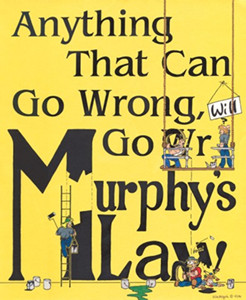(单词翻译:单击)

Broadcast on COAST TO COAST: November 20, 2003
AA: I'm Avi Arditti with Rosanne Skirble, and this week on Wordmaster — letters from listeners.
RS: Our segment on the origin of Murphy's Law — which states that if something can go wrong, it will go wrong — drew some responses. One came from Nick Spark, associate editor of Wings Magazine, an aviation history magazine. He spent the last year studying the origin of Murphy's law and wanted to add a few points.
AA: Nick Spark says the history of Murphy's Law is, in effect, a victim of Murphy's Law. We know it came out of a test of a rocket sled in the 1940s. The test involved a famous Air Force colonel, John Paul Stapp, and, among others, an engineer named Ed Murphy. A simple wiring mistake caused an acceleration meter to fail.
RS: Beyond that, Nick Spark says there is no way to know definitively who said what and who deserves what credit for Murphy's Law. He also says Murphy's Law was actually more of an optimistic statement, not the pessimistic view of things as we now use it. John Paul Stapp, a doctor, went on to improve automobile safety.
SPARK: "'If it can go wrong, it will go wrong.' Well, look to prevent it from going wrong. Make it so it can't happen, then it won't go wrong. And John Paul Stapp himself who's involved in putting seatbelts in American cars certainly looked at it in that respect. He saved a lot of people's lives by putting a seatbelt in a car so when something did go wrong, people's lives were saved. And, I mean, it's actually very funny, because Murphy's Law is by now far more famous than John Paul Stapp himself, and he was on the cover of Time magazine in the 1950s."
AA: Nick Spark says Stapp didn't like to talk about his role in the coining of Murphy's Law.
SPARK: "He viewed it as a real distraction from the real message that he wanted to send out in the world, which is: look everybody, buckle up."
RS: We also asked our listeners to suggest their own versions of Murphy's Law. Our friend Sebastiao Albano in Lavrinhas, Brazil, wrote: "I have the feeling that Mr. Murphy was a Brazilian. I say that because here, everything that works all over the world is yet to be constructed. Moreover, that law gets me every day:
"1. When I am alone at home, completely soaped under the shower, the telephone or the door bell rings.
"2. When I am in a hurry to type at work my computer refuses to turn on. I have to try between 20 and 50 times to turn it on.
AA: "3. When my computer definitely refuses to work I go to a cybercafe downtown and it is crowded.
"4. If I pass by the cybercafe some days later, with nothing in the world to do, it is completely empty.
RS: And "5. When I say everything right all my students are sleeping, but if I say something wrong they are completely awake.
AA: We also heard from William McGehee, who wrote: "I coined a phrase that I used when I was working in Saudi Arabia, because of so many different things that used to come up that I didn't know about: 'the knowing how is in the doing.'"
RS: This next letter has to do with a hand gesture we talked about with Melissa Wagner, author of "The Field Guide to Gestures."
AA: You put your pointer finger and little finger up, then hold down the two middle fingers with your thumb. In Texas, it's a way to mimic longhorn cattle, to show support for a college football team, the Texas Longhorns.
RS: And, as Melissa Wagner went on to explain, it's also become a popular gesture of affinity among fans at rock concerts.
WAGNER: "But the funny thing I found out is that in other parts of the world, it can actually mean your wife is cheating on you."
AA: And why is that? "I send you this e-mail in order to explain the connection between the horns gesture and infidelity," writes our friend Daniel Ortega in Madrid.
"It has its origin in the Greek myth of the Minotaur, a man with a bull's head, kept in a Cretan labyrinth and fed with human flesh. Before he ascended the throne of Crete, Minos struggled with his brothers for the right to rule. Minos prayed to the sea god Poseidon to send him a white bull, as a sign of approval by the gods for his reign. He promised to sacrifice the bull as an offering, and as a symbol of subservience.
RS: "A white bull emerged from the sea, but Minos liked the bull so much that he neglected to sacrifice it. As a punishment, Poseidon caused the king's wife to fall in love with the bull. The offspring of their lovemaking was a monster called the Minotaur. When Minos saw the newborn horned creature he discovered his wife's infidelity. That is the reason why in certain Mediterranean countries, such as Spain or Italy, horns are related to infidelity.
AA: "In Spanish, we say the husband of a faithless woman is 'horned.' Furthermore, if a woman cheats on her husband we say that she 'puts the horns on him.' Of course, the horns gesture means infidelity in Spain. Curiously, the animal that represents Spain is a bull. Sincerely yours, Daniel Ortega."
RS: And that's all for Wordmaster this week. Our e-mail address is word@voanews.com, and our Web site is voanews.com/wordmaster. With Avi Arditti, I'm Rosanne Skirble.
词汇点津:
今天词汇大师向我们详细讲述了Murphy's Law也就是墨菲定理。这可是西方最著名 的定律之一,不能不知!它的定义是这样的:If something can go wrong, it will go wrong.就是说,凡是可能出错的事必定会出错,指的是任何一个事件,只要具 有大于零的机率,就不能假设它不会发生。
墨菲定律的历史可追溯至1949年间,由当时美国空军高速载人火箭雪橇 (Rocket sled )MX981发展计划的研究员提出,以研发工程师爱德华·A·墨菲 (Major Edward A. Murphy, Jr.)命名。当时模拟实验已清晰要求参与者把夹子用正面夹好,结果还是有人 连续47个夹子都夹错了,故此引申出一个理论:一件事可以差得很离谱的时候便会差到极限。
墨菲定律是管理哲学的一个论点,包含着悲观主义的元素,但当代又衍生出了许多积极 的版本,我们亦可从乐观一方去看待墨菲定理:若要成功,早晚总会成功。
而后AA和RS又谈到了horn手势,在不同的地方,它的寓意可是大相径庭。比如,在美国德 克萨斯州,球迷常用它表示对球队的支持,后来这个手势泛指了对偶像的喜爱与支持。 但在地中海沿岸,horn由希腊神话而来,代表妇人的不贞,在西班牙,人们更是用 短语put the horns on him来表示女人的出轨。


